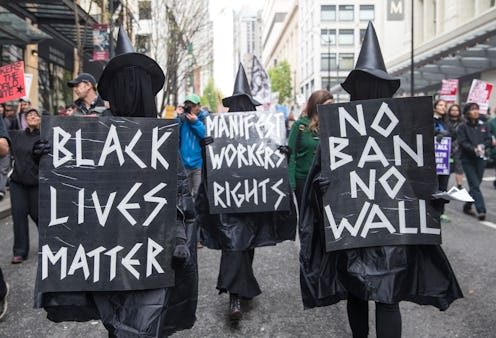
Recently, Donald Trump exasperated historians, political analysts, feminists, and IRL witches alike when he proclaimed to be the victim of witch hunt on Twitter. In response to mounting criticism — and the appointment of a special counsel to investigate Trump's ties to Russia — the 45th President of the United States tweeted: "This is the single greatest witch hunt of a politician in American history!”
As Trump's crocodile tears soaked into cyberspace, his message was clear: Trump is not, as we might believe, an infamous bully, but instead one of the bullied. Although this tweet was hardly the billionaire businessman's first hypocritical act while in office (see: speaking out against sexual assault, for starters) his flagrant ignorance about witch hunts stirs up an unsavory past too often left out of high school history text books. Trump's comment references very real political persecution that has cost many American people their livelihoods, and centuries of brutality that cost many more people their lives. In short: Trump has absolutely no idea what a "witch hunt" truly is.
Below are four facts sourced from the upcoming book Witches, Sluts, Feminists: Conjuring the Sex Positive about historical and contemporary witch hunts and the origins of the popular phrase:
1The Phrase's Overuse Has Diminished Its Original Meaning
According to historian John Demos, the witch hunt is “a mode (most often) of moral reproach.” You’ll find the label readily affixed when there appears to be “some allegation of subversive intent, of conspiratorial menace, of concealed betrayal.”
In the past few decades, the phrase has most often been used to damn a party, corporation, or group, whether it be the GOP’s witch hunt against Planned Parenthood, or the liberal media’s witch hunt against basically anyone in the GOP. However, what its contemporary usage regularly fails to take into account is the fact that the original witch hunts were political tools used by those firmly in power to exert control over those in more precarious social and political positions.
2Witch Hunts Have Been Part Of Politics For Over 500 Years
Most Americans rarely learn about this legacy of brutality, but some 50,000-100,000 people — the majority women — were accused of witchcraft and put to death in Europe between the 15th and 17th centuries. At the time, folks were hard pressed to explain the widespread death, disease, and daily hardships they faced, and evil was the simplest scapegoat. Add a propensity for superstition on the part of the Catholic Church to local governments hungry to suppress dissent and assert their dominance, and you have a recipe for conflict.
Christian narratives that demonized women and non-believers had a lot do with the early modern witch hunts, but so did local governments. Although the witch craze may have gotten its start in the church, the state ran with it, and witchcraft eventually morphed from heresy to treason — a crime against the community itself. Cloaked in the guise of the supernatural, the witch hunt has since been a political tool employed to manipulate a given populace and decide who is a friend of the state, and who is an enemy of it.
3The Salem Witch Trials Shaped American Understandings Of Witch Hunts
What happened in Salem in 1692 has been called by the "single greatest witch hunt in American history" for good reason. Ask anyone educated in the States about it, and they’re likely to come up with a salacious tidbit about that eventful year. It’s nearly impossible to escape middle school without learning something of the Satanic panic unleashed in the small New England village. Dozens exhibited strange symptoms and hundreds were implicated in inflicting a witching on unsuspecting members of their community. But what most of us know about Salem, however, is from the art and literature spun from its legacy, not actual actual historical facts.
The most widely read fictional work about Salem is Arthur Miller's The Crucible, which uses the 1692 witch trials to create a thinly veiled social commentary on McCarthyism. In the 1940's and 1950's, Senator Joseph McCarthy's anti-Communist offensive cost hundreds of writers and entertainers their jobs and even resulted in jail time for Americans suspected of sympathizing with Communist beliefs. So what made this specific phenomenon a witch hunt? The fact that a branch of the U.S. government sought to unjustly target private citizens who had limited resources to defend themselves.
4Witch Hunts Have An Undeniable Gendered Dimension
Centuries ago, there were many reasons why you might be accused of witchcraft, but being a woman was frequently a deciding factor. Witchcraft historian Lyndal Roper explains that “the themes of the witch trials recur with monotonous regularity across Western Europe, featuring sex with the Devil, harm to women in childbed, and threats to fertility...all issues which touch centrally on women’s experience.” With little recourse, mothers, sisters, and daughters were accused of Satanic sorcery by husbands, family members, neighbors, local officials, kings, and the clergy. At times, men would bear the brunt of witchcraft accusations — but it was often older, poor women who paid the price.
Today, the connotation of "witch hunt" may no longer carry a gendered dimension to most people who use it, but there are vestiges of a barbarous history within its syllables. It's only fitting that the most anti-woman president in memory attempt to strip the phrase of its original meaning and ignore its misogynistic history, but thankfully, there are plenty of scholars, journalists, and witches alike who will not let the true meaning of the "witch hunt" be relegated to the refuse bin of history.